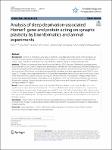Item Infomation
Full metadata record
| DC Field | Value | Language |
|---|---|---|
| dc.contributor.author | Yun, Li | - |
| dc.contributor.author | Lina, Zhao | - |
| dc.contributor.author | Qi, Zhou | - |
| dc.date.accessioned | 2023-03-16T04:17:33Z | - |
| dc.date.available | 2023-03-16T04:17:33Z | - |
| dc.date.issued | 2023 | - |
| dc.identifier.uri | https://link.springer.com/article/10.1007/s44254-023-00010-w | - |
| dc.identifier.uri | https://dlib.phenikaa-uni.edu.vn/handle/PNK/6908 | - |
| dc.description | CC BY | - |
| dc.description.abstract | Sleep plays an important role in people's physical and mental health [1]. Good sleep can not only effectively enhance the brain's ability to remove harmful substances, but also help maintain brain function [2], including mental health, supporting learning and memory, and regulating synaptic plasticity, in the process of which genes involved in sleep, especially those expressions with the circadian rhythm in brain, are crucial regulators [3]. Recent research evidence has shown circadian regulation of sleep-dependent gene expression produces short-term or even long-term changes in brain behavior and function [4]. Conversely, sleep deprivation (SD) may damage the brain by disrupting gene expression related to the sleep–wake cycle of synaptic proteins [3, 5]. SD can affect gene expression, especially those involved in neuronal plasticity and neuropsychiatric disorders, which are critical for brain health [3, 6]. | vi |
| dc.language.iso | en | vi |
| dc.publisher | Springer | vi |
| dc.subject | sleep deprivation | - |
| dc.subject | brain behavior and function | - |
| dc.title | Analysis of sleep deprivation-associated Homer1 gene and protein acting on synaptic plasticity by bioinformatics and animal experiments | vi |
| dc.type | Book | vi |
| Appears in Collections | ||
| OER- Y học- Điều dưỡng | ||
Files in This Item:

